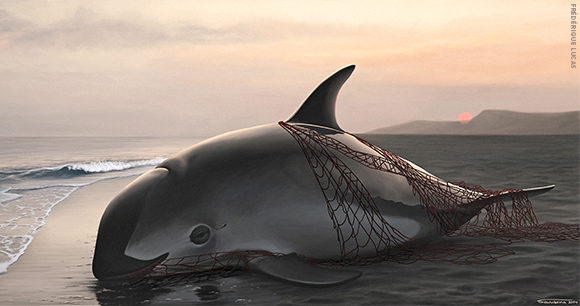
Mexico Urged to Take Action to Save Critically Endangered Vaquita, Totoaba
Riyadh, Saudi Arabia—The UNESCO World Heritage Committee decided today to maintain the “in danger” status for the last remaining habitat of the vaquita porpoise and the totoaba fish. Only 10 vaquitas remain in the world—all in a small area of Mexico—and the committee urged Mexico to immediately adopt corrective measures to save the critically endangered porpoise.
In 2019, the World Heritage Committee designated Mexico’s islands and protected areas of the Gulf of California World Heritage site as “in danger” in response to a 2015 petition filed by the Center for Biological Diversity and the Animal Welfare Institute.
Vaquita inhabit a relatively small area in the Upper Gulf of California. Although gillnet fishing is banned in the vaquita’s primary habitat, known as the “zero tolerance area” (ZTA), as well as in an area that encompasses the vaquita’s historic range, the law is not adequately enforced.
“I’m grateful the World Heritage Committee is holding Mexico accountable, but it’s sobering that the country has again failed to meet its international commitments to eliminate threats to the few remaining vaquita,” said Alejandro Olivera, senior scientist and Mexico representative at the Center for Biological Diversity, who is attending the committee meeting in Riyadh. “Despite a 2020 ban, deadly shrimp gillnets are still being used in vaquita habitat, and the next shrimp season is set to begin this month. Mexico must act immediately to expand the protected area for the vaquita and finally enforce existing regulations during the upcoming shrimp fishing season.”
Vaquita face a single overwhelming threat: entanglement in gillnets illegally set to capture shrimp and various fish species, especially totoaba. Totoaba swim bladders are smuggled by organized criminal syndicates from Mexico primarily to China, where they are highly prized for their supposed medicinal benefits. Despite reported declines in illegal fishing within the ZTA, illegal fishing outside the area was still widespread during the most recent December-to-May totoaba fishing season.
The World Heritage Committee reviewed Mexico’s recent enforcement actions, including illegal fishing data, and found them to be “not fully effective.” For the “in danger” designation to be lifted, Mexico must work with UNESCO and the International Union for Conservation of Nature on several objectives:
- Strengthen law enforcement efficiency
- Increase penalties for illegal totoaba trade
- Eliminate illegal fishing gear
- Implement a permanent ban on gillnets
- Cooperate with other nations to stop the illegal trade of totoaba swim bladders
- Promote sustainable fisheries using environmentally-friendly fishing gear
The committee also directed Mexico to consult with key stakeholders and submit a detailed plan of action, including timelines. Failure to adopt these measures could result in the site losing its World Heritage status.
“While we applaud the World Heritage Committee’s clear directive to Mexico today to protect this unique and important world heritage site, we are concerned that these corrective measures lack any sense of urgency,” said DJ Schubert, a wildlife biologist with the Animal Welfare Institute. “We fear that Mexico will continue to avoid fully implementing and enforcing its own laws while the vaquita hover on the very precipice of extinction.”
Marjorie Fishman, Animal Welfare Institute
[email protected], (202) 446-2128
Alejandro Olivera, Center for Biological Diversity
[email protected], (202) 849-8403
The Animal Welfare Institute (awionline.org) is a nonprofit charitable organization founded in 1951 and dedicated to reducing animal suffering caused by people. AWI engages policymakers, scientists, industry, and the public to achieve better treatment of animals everywhere—in the laboratory, on the farm, in commerce, at home, and in the wild. Follow us on Facebook, Twitter, and Instagram for updates and other important animal protection news.
The Center for Biological Diversity (biologicaldiversity.org) is a national, nonprofit conservation organization with more than 1.7 million members and online activists dedicated to the protection of endangered species and wild places.